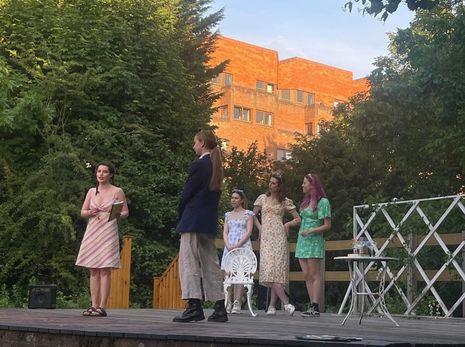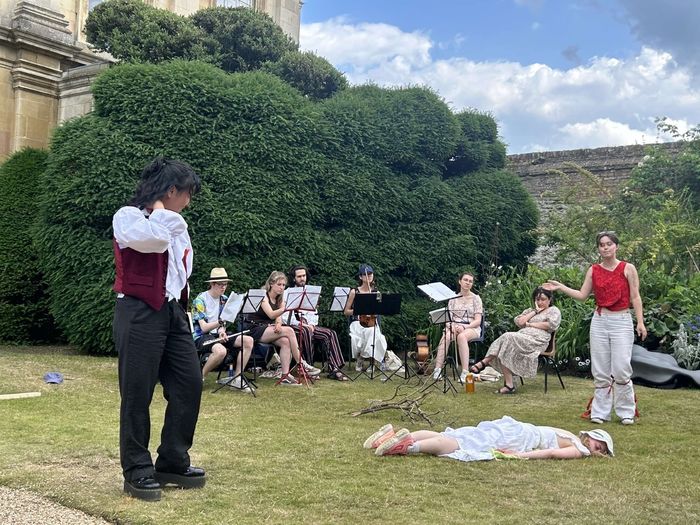Love’s Labour’s Lost is is a wry and wistful rumination
This ambitious relocation naturally complements the bittersweet tone of May Week – and the sadness of a looming end to a year at Cambridge

There is a moment at the end of Love’s Labour’s Lost where Dumaine (Daniel Pereira) demands of his love Katherine (Emily Sparkes): “But what to me? A wife?”. Her answer, “a beard”, floored the audience. It perfectly snagged Shakespeare’s capacity to be reworked for modern relevance, alluding (knowingly, I’d like to think) to the camp sensibilities that inflected this year’s Brickhouse May Week Play. There was the air of playful hedonism, the campy acidity of the Princess of France (Lily Kemp) and her companions — and some extremely short shorts sported by the play’s leading men, who can’t help but nurture a homoerotic flair as they pledge, rather weakly, to stave away from female contact and focus on their ‘studies’ with one another instead. As the audience recovered from the obliteration, I was briefly arrested in thought, wondering what the play might have looked like had its queer subtext been milked for all it was worth.
“The show aims to capture the fleeting, poignant nature of summer flings”
Probably not much different — and besides, directors Max Mason and Arianna Muñoz didn’t need to go so far. Their vision, relocating Shakespeare’s comedy of courtly courtship to a holiday destination in France, is already plenty ambitious. Per its Camdram profile, the show aims to capture the fleeting, poignant nature of summer flings, drawing inspiration from the likes of Call Me by Your Name. As a result, it foregrounds the whirlwind nature of the play’s romances, as well as their abrupt end in its notorious anticlimax. Their aim is helped by a largely efficient cast. Kemp is utterly magnificent as the Princess, and after a brief Camdram search I was disappointed to see that her repertoire was not larger for someone with her excellent comedic chops. Gracefully sharp and cutting, she leads the charge of her handmaidens as they expose the passion belying the four would-be-stoics — King Ferdinand (Bill Freeman) and his lords, whose steadfast chauvinism quickly melts into wide-eyed swooning.
“The play’s comedy worked best when it embraced physicality and veered outside the box”
The sheer scale of this relocation is to be commended even if it didn’t always sustain itself. In the original play, the courtship between the noble couples finds a bawdier parallel in the romance between Armado (Noah Chamberlain) and Jacquenetta (Keziah Prescod), two lower-echelon figures in court. With a change of setting, divorced from this context, the relationship between the two camps became patchy and consequently, the dual plotlines lacked congruency until the very end, leaving the audience to do a lot of guesswork. The same could be said of the doubling-up of certain roles without much clarity, making the action hard to follow at times. The scenes between Armado and his compatriots sometimes felt neglected directorially — though this did not stop them being speckled by moments of comic brilliance, notably from Fran Lees, who stole each of her scenes with an over-the-top electricity that charged up the stage. When she, Chamberlain, and Sir Nathaniel (Helen Brookes) stepped out for their play-within-a-play, resembling John Cleese and the Two Ronnies’ “Class sketch” complete with bowler hats, I was bowled over before they even began to speak.
The play’s comedy worked best, though, when it embraced physicality and veered outside the box. There is a moment where Berowne (Eoin McCaul) scales the top of one of the lighting stands at the back of the audience, trebucheting his barbs into the crowd from ten metres in the air. At another point, Lees wrestles away from her captor and launches herself, giggling, off the stage and all the way through the Robinson Gardens, opening up the play to its exterior greenery and in a way that felt wonderfully immersive. Mason and Muñoz must have known they were onto a good thing here. It reached a high point with each of the four lords scrambling for cover and confessing his romance, resulting in a marvellous piece of slapstick as Berowne’s torn-up love letters were pieced together and a red-faced McCaul confronted with his character’s hypocrisy. I just wish more scenes had been peppered with this brilliant kineticism.
All that said, the directors’ vision blended with the play best at its conclusion, configuring its disruptive ending in a way that made perfect thematic sense. Having finally reconciled, the lovers’ entertainment is cut short by the death of the Princess’s father, demanding an immediate return and the postponement of marriage. The brutal interruption of sadness couldn’t help but find a personal tangent to the audience — who wasn’t reminded of their own lives, and the sudden end to term that would arrive in the next day or two, topping a blurry, whirlwind May Week? Ordering Ferdinand to wait for a year, Kemp sadly, sweetly tells him to then “come challenge me…I will be thine”. At the heart of the directors’ aim, I imagine, was to tackle this uniquely poignant end to a Shakespeare comedy, one that separates it from all others in his oeuvre, and in this they succeeded, with a bittersweet ending of satisfying tragicomic unity. Their ambition became most understandable in its final impression on the audience, leaving us sufficiently serendipitous as we watched our final play of the year — and for many, serial director Muñoz included, their last in Cambridge.
Love’s Labour’s Lost played at the Maria Bjornson Theatre in the Robinson College Gardens from 21st to 22nd June, 2023 at 7:30pm
 News / Christ’s announces toned-down ‘soirée’ in place of May Ball3 February 2026
News / Christ’s announces toned-down ‘soirée’ in place of May Ball3 February 2026 News / Right-wing billionaire Peter Thiel gives ‘antichrist’ lecture in Cambridge6 February 2026
News / Right-wing billionaire Peter Thiel gives ‘antichrist’ lecture in Cambridge6 February 2026 News / John’s duped into £10m overspend6 February 2026
News / John’s duped into £10m overspend6 February 2026 News / Epstein contacted Cambridge academics about research funding6 February 2026
News / Epstein contacted Cambridge academics about research funding6 February 2026 News / Corpus FemSoc no longer named after man6 February 2026
News / Corpus FemSoc no longer named after man6 February 2026










